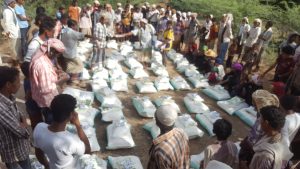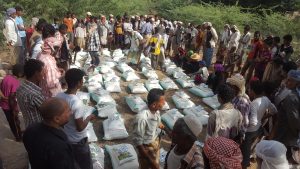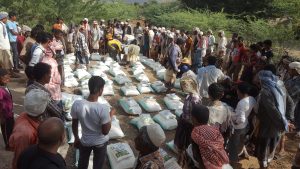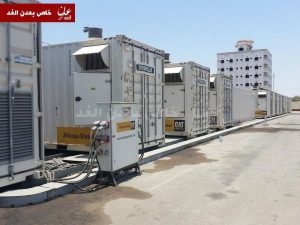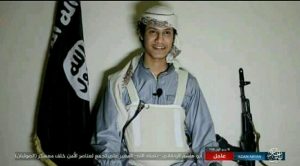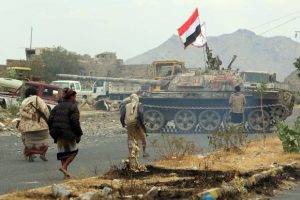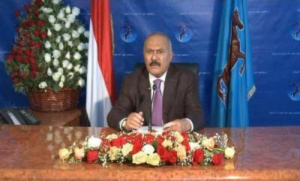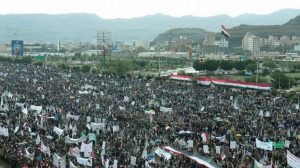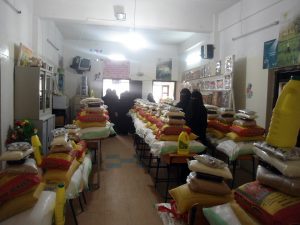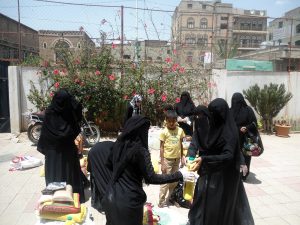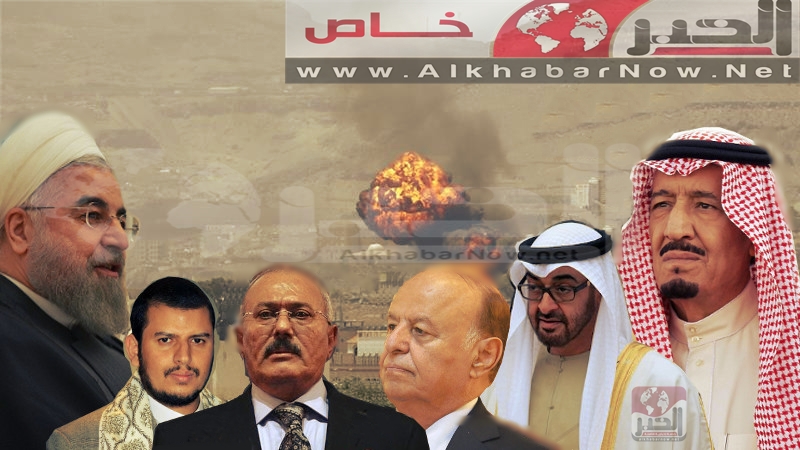
Kämpfen um die Vormacht im Jemen (von links): iranischer Präsident Hassan Rohani, Houthi-Führer Abdelmalik alHouthi, Expräsident Ali Abdullah Saleh, Präsident Abdrubbah Mansur Hadi, Präsident der Emirate Mohamed bin Zayed, saudischer König Salman bin Abdelaziz
On 17th February 2017, the UN published the “Final Report of the Panel of Experts on Yemen”, for which a panel of experts had investigated and described the impact of UNSR resolutions 2140 and 2216 on 242 pages. The direct reference to UNSR resolutions, representing the interests of the Saudi coalition and the so-called legitimate government in 2014 and 2015, explain a certain unilateral aspect of the reports, unilateral since only the weapon supplies from Iran to the Houthis but not those of the Gulf countries, the USA und GB for Hadi, alQaida and Salafistic militia were questioned, only the sanctions of Saleh and his son and also the al-Houthi leadership were investigated but not the financial transactions of Hadi and his clans. Nevertheless, the report offers new insight and conclusions, above all by describing, relatively unbiased, violations of martial law, acts against humanity and human rights committed by all parties. The most important items of the report in a short summary read :
- All countries involved in the war and also Hadi´s government are responsible for war crimes and violations of human rights committed. This is of special importance since e.g. Saudi Arabia conjures up excuses for the attack at the funeral celebration in Sana´a with 150 killed and 600 wounded, attributing this to the failure of one individual. The allocation of blame also includes the „collateral damage“ suffered by the civilian population during US drone attacks:
“All States whose forces engage in or otherwise participate in military operations on behalf of the coalition are responsible for all acts committed by persons forming part of its armed forces. These States may not evade their obligations by placing their contingents at the disposal of an ad hoc coalition. All coalition member States and their allies also have an obligation to take appropriate measures to ensure respect for international humanitarian law by the coalition. This obligation is especially incumbent upon the Government of Yemen, upon whose request and with whose consent the air strikes are being conducted.”
This will please the governments of Morocco and Egypt having withdrawn from the air raids in good time. Hadi will, in all probability, have to stand trial at the International Court in The Hague. - The air raids of the Saudi coalition have devastated the Yemeni infrastructure and terrorised the population but failed to bend the will of the Houthi-Saleh-Alliance to continue the war.
- The Houthi-Saleh attacks at ships navigating in the Red Sea have increased the risk of a regional extension of the conflict. The Houthi-Saleh-Alliance has shown considerable fitness for action in maritime war.
- The transfer and smuggling of weapons by sea from Iran to the Houthis has so far not been clearly provable. Several incidents of weapon supplies on vessels departing from Iranian harbours in the Gulf have been investigated but – on the basis of the routes chosen and the telephone conversations monitored – it looks pretty obvious that the vessels were destined for Somalia. Evidence that Iranian weapons had been brought from there to Yemen could not be found. The alleged weapon transfer from Iran to the Houthis had initially been massively postulated by Israel, followed by the permanent publication of alarm announcements. Saudi Arabia keeps making use of these “fake news” in order to justify the war against Yemen and the embargo of supplies of vital resources for the population.
- The transfer of the Yemeni central bank to Aden by Hadi´s government has opened an effective „economic front“ in this war and considerably curtailed the economic capacities of the Houthi-Saleh-Alliance in the military continuation of the conflict and also the administration of the areas under their control. Simultaneously, the vital resources for the population have become so very scarce that the humanitarian disaster accelerates.
The report also refers to the activities of the so-called Hizam-associations, installed by the Emirates as their own security troops in “freed Yemen” and active in four provinces. Complaints about abuse, intimidation, arrest and partly also torture keep increasing on the part of the population. This refers in particular to the so-called “Hadrami Elite troops”, supposedly representing an anti-terror unit and carrying out torture in routine manner in secret prisons. The report gives the following wording:
“The Panel finds that, even if these individuals were associated with AQAP, the Government is obliged under international humanitarian law and international human rights law to ensure that the Hadrami Elite Forces, or any other forces operating on the ground under the authority and/or control and/or with the consent of the Government, comply with relevant legal requirements and procedural safeguards regarding deprivation of liberty … Given that the United Arab Emirates also has ground forces operating in Mukalla, their government has similar obligations. The United Arab Emirates have informed the Panel that the coalition has provided “military, financial and training assistance” and “intelligence, logistic information and aerial intervention” to the Hadrami Elite Forces, which are under the control of the legitimate Yemeni Armed Forces.”
The Emirates have been considered responsible also for crimes and violations of rights by the Hizam troops even if the Hizam forces proforma operate under the name of Yemeni government forces. In actual fact the Hadi regime has no control over the Hizam troops.
Quite interesting is also the minutely detailed report about attempts of Khaled Ali Saleh, one of Ali Abdullah Saleh´s son and Ahmed Ali Saleh´s brother to circumvent the sanctions imposed upon them, in particular the freezing of accounts, and launder money. The panel has tracked the itinerary of the accounts (totalling three-digital US million amounts) in six banks in six countries. No money transfer abroad could be verified as regards the sanctioned Houthi-leaders.
- The present sphere of influence of Ali Abdullah Saleh has been carefully scrutinized and leads towards the conclusion that he has remained quite powerful, to be explained by the networks he established during his 30 years as president, in particular among the tribes, with the militia and in his party Moutamar. His close and stable connexions with the usually not consistently loyal tribes were strengthened and stabilized by means of a clever marriage policy pursued with his multiple daughters and sons.
- Furthermore, by using the example of 10-12 proven violations, the report minutely describes the war crimes against the civilian population on both sides. The selected cases have been proven by documentary material although the Panel had not been permitted a research in situ.
